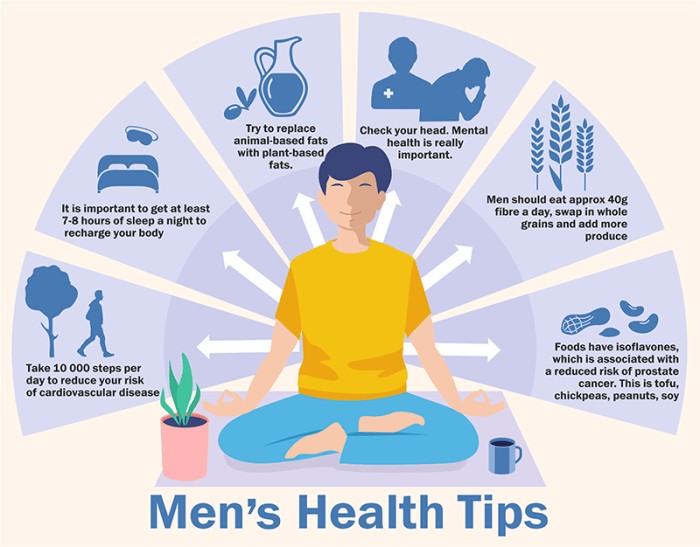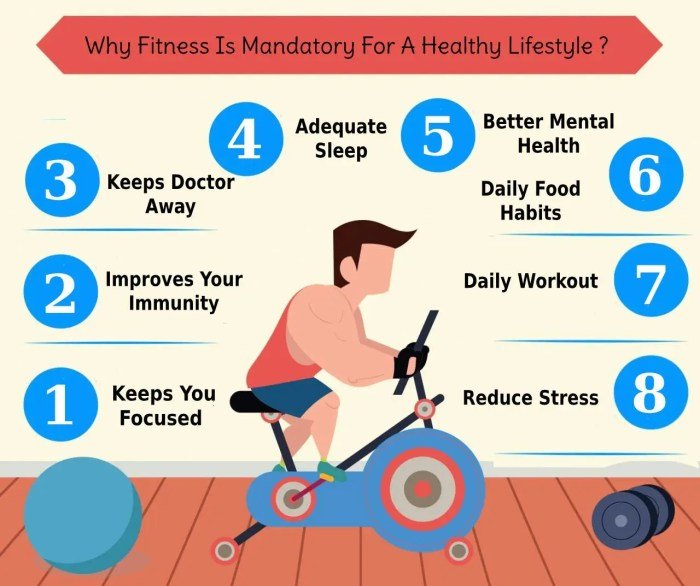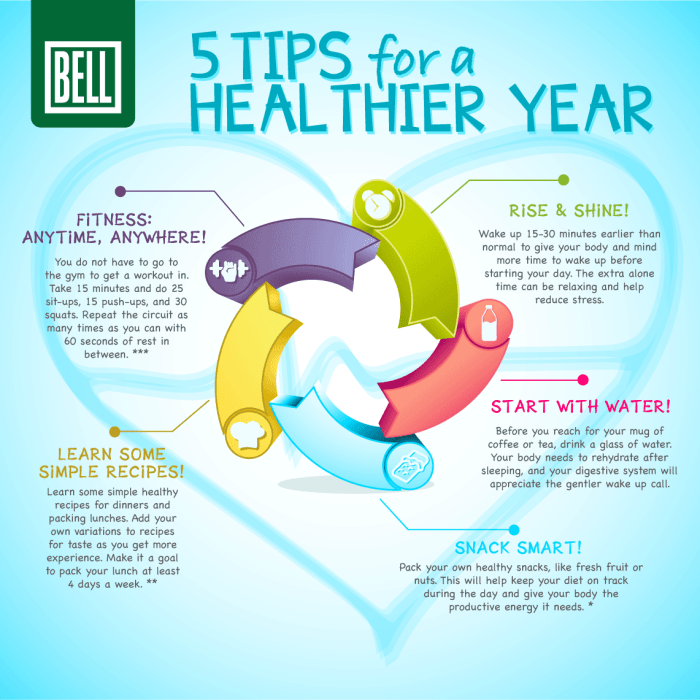Health and tips are at the forefront of a fulfilling life, and this guide provides valuable insights into enhancing your well-being. From physical fitness and mental wellness to nutrition and sleep, we’ll explore a range of topics that empower you to make informed choices for a healthier lifestyle.
This comprehensive journey delves into practical strategies, evidence-based advice, and actionable steps to help you achieve your health goals.
Whether you’re looking to boost your energy levels, reduce stress, or simply feel your best, this guide is designed to be your companion on the path to optimal health. We’ll discuss the importance of regular exercise, balanced nutrition, mindfulness techniques, and quality sleep, all essential components of a vibrant and fulfilling life.
Join us as we navigate the intricacies of health and wellness, empowering you to take control of your well-being and live a life filled with vitality and purpose.
Physical Health

Physical health is an essential aspect of overall well-being, and it plays a crucial role in our quality of life. Engaging in regular exercise, maintaining a balanced diet, and adopting healthy lifestyle habits are fundamental pillars for achieving and sustaining good physical health.
Regular Exercise
Regular exercise is essential for maintaining good physical health and preventing chronic diseases. Physical activity strengthens muscles and bones, improves cardiovascular health, boosts mood, and helps manage weight.Here is a sample weekly workout routine:
- Monday:Cardio (30 minutes) – brisk walking, jogging, or cycling
- Tuesday:Strength training (45 minutes) – focus on major muscle groups (legs, chest, back, shoulders, arms)
- Wednesday:Rest or light activity (yoga, stretching)
- Thursday:Cardio (30 minutes) – swimming, dancing, or hiking
- Friday:Strength training (45 minutes) – focus on different muscle groups than Tuesday
- Saturday:Active rest (walking, gardening, or playing sports)
- Sunday:Rest or light activity (yoga, stretching)
Balanced Diet
A balanced diet provides the body with essential nutrients for optimal functioning. It should include a variety of fruits, vegetables, whole grains, lean protein, and healthy fats.Here is a detailed meal plan for a week:
- Monday:
- Breakfast:Oatmeal with berries and nuts
- Lunch:Salad with grilled chicken or fish
- Dinner:Baked salmon with roasted vegetables
- Tuesday:
- Breakfast:Yogurt with granola and fruit
- Lunch:Whole-wheat sandwich with turkey and avocado
- Dinner:Lentil soup with whole-wheat bread
- Wednesday:
- Breakfast:Smoothie with spinach, banana, and protein powder
- Lunch:Leftover lentil soup
- Dinner:Chicken stir-fry with brown rice
- Thursday:
- Breakfast:Scrambled eggs with whole-wheat toast
- Lunch:Salad with chickpeas and tahini dressing
- Dinner:Vegetarian chili with cornbread
- Friday:
- Breakfast:Whole-wheat pancakes with fruit and syrup
- Lunch:Leftover vegetarian chili
- Dinner:Pizza with whole-wheat crust, vegetables, and lean protein
- Saturday:
- Breakfast:Waffles with fruit and whipped cream
- Lunch:Burgers with whole-wheat buns and vegetables
- Dinner:Pasta with marinara sauce and meatballs
- Sunday:
- Breakfast:French toast with fruit and syrup
- Lunch:Leftover pasta
- Dinner:Roasted chicken with mashed potatoes and green beans
Sedentary Lifestyle and Health Risks
A sedentary lifestyle, characterized by prolonged periods of inactivity, poses significant health risks. These include:
- Increased risk of heart disease:Lack of physical activity weakens the heart muscle and increases the risk of cardiovascular disease.
- Obesity:A sedentary lifestyle contributes to weight gain, increasing the risk of obesity-related conditions.
- Type 2 diabetes:Physical inactivity impairs the body’s ability to regulate blood sugar levels, increasing the risk of type 2 diabetes.
- Mental health issues:Sedentary behavior is linked to depression, anxiety, and other mental health problems.
- Osteoporosis:Lack of weight-bearing exercise weakens bones, increasing the risk of osteoporosis.
To mitigate these risks, it is essential to incorporate physical activity into daily life. This can include:
- Taking the stairs instead of the elevator
- Walking or cycling to work or errands
- Standing up and moving around every hour while working
- Engaging in recreational activities that involve physical movement
Benefits of Different Types of Exercise
Different types of exercise offer unique benefits:
| Type of Exercise | Benefits |
|---|---|
| Cardiovascular Exercise | Improves heart health, strengthens lungs, burns calories, reduces stress |
| Strength Training | Builds muscle mass, increases bone density, improves metabolism, enhances strength and power |
| Flexibility Exercise | Increases range of motion, improves posture, reduces muscle soreness, enhances balance and coordination |
Mental Well-being

Mental well-being is an essential aspect of overall health, encompassing our emotional, psychological, and social well-being. It’s about feeling good about ourselves and our lives, having the capacity to cope with life’s challenges, and being able to contribute positively to our communities.
Managing Stress and Promoting Relaxation
Stress is a natural response to challenging situations, but chronic stress can negatively impact our mental health. It’s crucial to develop healthy coping mechanisms to manage stress and promote relaxation.
- Practice Mindfulness:Mindfulness involves paying attention to the present moment without judgment. It can help reduce stress and anxiety by focusing our attention on the here and now, rather than dwelling on past worries or future anxieties.
- Engage in Physical Activity:Exercise releases endorphins, which have mood-boosting effects. Regular physical activity can help reduce stress, improve sleep quality, and boost overall well-being.
- Spend Time in Nature:Spending time outdoors has been shown to have calming effects on the mind and body.
- Prioritize Sleep:Adequate sleep is essential for both physical and mental health. Aim for 7-8 hours of quality sleep each night.
- Practice Relaxation Techniques:Techniques like deep breathing, progressive muscle relaxation, and meditation can help calm the mind and body.
- Connect with Loved Ones:Strong social connections provide support and a sense of belonging, which can buffer against stress.
Mindfulness and Guided Meditation
Mindfulness is a practice that involves paying attention to the present moment without judgment. It’s about observing our thoughts, feelings, and sensations without getting carried away by them. Mindfulness can help reduce stress, improve focus, and enhance emotional regulation.Here is a guided meditation script to help you practice mindfulness:
Find a comfortable position, either sitting or lying down. Close your eyes gently. Take a few deep breaths, inhaling slowly and deeply through your nose, and exhaling slowly through your mouth. As you breathe, notice the rise and fall of your chest. Bring your attention to your body. Notice any sensations you feel, such as the weight of your body on the chair or the floor, the feeling of your clothes against your skin. Don’t judge these sensations, simply observe them. Now, bring your attention to your breath. Notice the sensation of each inhale and exhale. If your mind wanders, gently bring it back to your breath. Continue to focus on your breath for a few minutes. When you’re ready, slowly open your eyes.
Sleep and Mental Health
Sleep is crucial for our mental health. When we don’t get enough sleep, it can affect our mood, concentration, and ability to cope with stress.
- Establish a Regular Sleep Schedule:Go to bed and wake up at roughly the same time each day, even on weekends, to regulate your body’s natural sleep-wake cycle.
- Create a Relaxing Bedtime Routine:Wind down an hour or two before bed by engaging in calming activities like taking a warm bath, reading, or listening to soothing music.
- Optimize Your Sleep Environment:Ensure your bedroom is dark, quiet, and cool.
- Avoid Caffeine and Alcohol Before Bed:These substances can interfere with sleep quality.
- Get Regular Exercise:Physical activity can improve sleep quality, but avoid exercising too close to bedtime.
Mental Health Resources
There are many resources available to support mental well-being.
- Mental Health Hotlines:These provide immediate support and resources.
- Mental Health Apps:Apps offer tools for managing stress, anxiety, and depression.
- Online Communities:Online communities provide a platform for connecting with others who share similar experiences.
- Therapy:Therapy can provide a safe and supportive space to work through mental health challenges.
Healthy Habits

Adopting healthy habits is essential for maintaining a high quality of life and reducing the risk of chronic diseases. These habits are not just about physical health but also contribute significantly to mental well-being.
Staying Hydrated
Staying hydrated is crucial for overall health. Water is essential for various bodily functions, including regulating body temperature, transporting nutrients, and flushing out waste products.
Staying healthy involves making informed choices and adopting practices that support well-being. One avenue to explore is the realm of connected health, where technology bridges the gap between individuals and healthcare professionals. Acelis Connected Health offers a platform that connects individuals with healthcare providers, empowering them to take control of their health journey.
By leveraging technology, connected health solutions can facilitate personalized care, improve access to information, and promote proactive health management.
- Drink water throughout the day: Aim for at least 8 glasses of water daily, especially during exercise or hot weather.
- Carry a reusable water bottle: Keep it filled and readily available to encourage frequent sips.
- Choose water over sugary drinks: Sodas, juices, and energy drinks can dehydrate you and contribute to weight gain and other health problems.
- Eat fruits and vegetables: Many fruits and vegetables contain high water content, contributing to your daily fluid intake.
Quitting Smoking
Quitting smoking is one of the best things you can do for your health. Smoking damages your lungs, heart, and blood vessels, increasing the risk of various cancers, heart disease, and stroke.
Maintaining a healthy lifestyle involves finding activities that you enjoy and can sustain. If you’re looking for a place to get a great workout and have fun, consider checking out the beede swim & fitness center. They offer a variety of classes and programs, from swimming to yoga, and their friendly staff can help you find the perfect fit for your needs.
Remember, the key to a healthy lifestyle is finding what works best for you, so explore different options and have fun along the way!
- Set a quit date: Choose a date and commit to quitting on that day.
- Seek support: Talk to your doctor, family, or friends about your decision and ask for their encouragement.
- Join a support group: Connecting with others who are going through the same experience can provide motivation and accountability.
- Use nicotine replacement therapy: Patches, gum, or lozenges can help reduce cravings and withdrawal symptoms.
- Avoid triggers: Identify situations or places that make you want to smoke and try to avoid them.
Regular Checkups and Screenings
Regular checkups and screenings are vital for early detection and prevention of health problems. They allow healthcare professionals to monitor your health, identify potential issues, and provide timely interventions.
- Schedule annual physical exams: These exams help assess your overall health, including blood pressure, cholesterol levels, and weight.
- Get recommended screenings: Depending on your age, family history, and other risk factors, you may need screenings for conditions like cancer, diabetes, and heart disease.
- Follow up on any abnormal results: If a screening identifies a potential issue, it’s important to follow up with your doctor for further evaluation and treatment.
Managing Screen Time
Excessive screen time can have negative impacts on mental and physical health. It can lead to eye strain, sleep disturbances, and decreased physical activity.
- Set screen time limits: Establish a daily or weekly limit for screen time and stick to it.
- Take breaks: Every 20-30 minutes, take a break from screens to rest your eyes and move your body.
- Create screen-free zones: Designate certain areas, such as the bedroom, as screen-free zones to promote better sleep and relaxation.
- Engage in other activities: Instead of spending all your free time in front of screens, engage in hobbies, social activities, or physical exercise.
Nutrition and Diet

A balanced diet is crucial for maintaining optimal health and well-being. It provides the body with the essential nutrients it needs to function properly, including energy, building blocks for tissues, and substances that regulate various bodily processes.
Macronutrients: The Building Blocks of a Healthy Diet
Macronutrients are essential nutrients that the body needs in large amounts. They provide energy and are the building blocks for tissues and organs. The three main macronutrients are protein, carbohydrates, and fats.
- Proteinis essential for building and repairing tissues, producing enzymes and hormones, and maintaining a healthy immune system. Good sources of protein include lean meats, poultry, fish, beans, lentils, tofu, and eggs.
- Carbohydratesare the body’s primary source of energy. They are broken down into glucose, which is used by cells for fuel. Complex carbohydrates, found in whole grains, fruits, and vegetables, are digested more slowly and provide sustained energy. Simple carbohydrates, found in sugary drinks and processed foods, are digested quickly and can lead to energy crashes.
- Fatsare essential for hormone production, cell membrane function, and insulation. Healthy fats, found in avocados, nuts, seeds, olive oil, and fatty fish, can help reduce the risk of heart disease and other chronic conditions. Unsaturated fats are generally considered healthier than saturated fats, which are found in red meat, butter, and full-fat dairy products.
Nutrient-Rich Foods: Fueling Your Body with Essential Nutrients
A variety of nutrient-rich foods should be included in a healthy diet to ensure the body receives all the essential vitamins, minerals, and antioxidants it needs. Here are some examples of nutrient-rich foods and their health benefits:
- Fruits:Rich in vitamins, minerals, fiber, and antioxidants. Examples include berries, citrus fruits, apples, bananas, and grapes. These nutrients contribute to overall health, immune function, and disease prevention.
- Vegetables:Packed with vitamins, minerals, fiber, and antioxidants. Examples include leafy greens, broccoli, carrots, bell peppers, and tomatoes. They support digestive health, reduce inflammation, and protect against chronic diseases.
- Whole Grains:Provide complex carbohydrates, fiber, and essential nutrients. Examples include brown rice, quinoa, oats, and whole-wheat bread. They promote satiety, regulate blood sugar levels, and support heart health.
- Lean Protein:Provides essential amino acids for building and repairing tissues. Examples include chicken, fish, beans, lentils, tofu, and eggs. They support muscle growth, maintain bone health, and boost metabolism.
- Healthy Fats:Provide essential fatty acids for hormone production and cell function. Examples include avocados, nuts, seeds, olive oil, and fatty fish. They contribute to heart health, brain function, and inflammation reduction.
Different Types of Diets: Exploring Dietary Options
Different dietary approaches cater to various needs and preferences. Some popular diet types include:
- Vegetarian Diet:Excludes all animal products, including meat, poultry, fish, eggs, and dairy. It emphasizes plant-based foods like fruits, vegetables, grains, legumes, and nuts. Vegetarian diets can be beneficial for reducing the risk of heart disease, type 2 diabetes, and certain cancers.
Maintaining good health is a journey, not a destination. It’s about finding activities you enjoy and making them part of your routine. If you’re in the Delafield, Wisconsin area, consider checking out be fitness delafield wisconsin , a fitness center known for its welcoming atmosphere and diverse class offerings.
Whether you’re a seasoned athlete or just starting your fitness journey, finding a place that supports your goals can make all the difference in achieving your health and wellness aspirations.
- Vegan Diet:A stricter form of vegetarianism that excludes all animal products, including honey and other animal-derived ingredients. It focuses on plant-based foods and emphasizes whole grains, fruits, vegetables, legumes, nuts, and seeds. Vegan diets can be beneficial for reducing the risk of chronic diseases, promoting environmental sustainability, and improving animal welfare.
- Mediterranean Diet:A dietary pattern inspired by the traditional cuisine of Greece and other Mediterranean countries. It emphasizes fruits, vegetables, whole grains, legumes, nuts, seeds, olive oil, and fish. The Mediterranean diet is rich in antioxidants and healthy fats, and it has been linked to reduced risk of heart disease, stroke, and type 2 diabetes.
Creating a Balanced Meal Plan: Principles of Healthy Eating
A balanced meal plan should include a variety of nutrient-rich foods from all food groups in appropriate portions. The following principles can help create a healthy eating plan:
- Eat a variety of foods:Include fruits, vegetables, whole grains, lean protein, and healthy fats in your diet.
- Limit processed foods:Processed foods are often high in unhealthy fats, sugar, and sodium. Choose whole, unprocessed foods whenever possible.
- Control portion sizes:Be mindful of how much you eat and avoid overeating. Use smaller plates and bowls to help control portion sizes.
- Stay hydrated:Drink plenty of water throughout the day. Water is essential for many bodily functions, including digestion, temperature regulation, and nutrient transport.
- Cook more meals at home:This gives you more control over the ingredients and preparation methods.
Sleep and Rest

Sleep is a fundamental human need, just as essential as eating, drinking, and breathing. It plays a crucial role in maintaining our physical and mental well-being. During sleep, our bodies and minds can repair and restore themselves, allowing us to function optimally when we’re awake.
Importance of Sleep
Sleep is essential for a healthy body and mind. It allows our bodies to repair and rejuvenate, and our brains to consolidate memories and process information. When we don’t get enough sleep, we can experience a range of negative consequences, including:
- Decreased cognitive function
- Increased risk of chronic diseases
- Mood swings and irritability
- Weakened immune system
- Increased risk of accidents
Creating a Relaxing Bedtime Routine, Health and tips
A consistent bedtime routine can signal to your body that it’s time to wind down and prepare for sleep. This routine should be relaxing and enjoyable, and it can include activities such as:
- Taking a warm bath or shower
- Reading a book
- Listening to calming music
- Meditation or deep breathing exercises
- Avoiding screen time for at least an hour before bed
Improving Sleep Quality
There are several strategies you can implement to improve your sleep quality. These include:
- Maintaining a regular sleep schedule, going to bed and waking up around the same time each day, even on weekends.
- Creating a sleep-conducive environment, making sure your bedroom is dark, quiet, and cool.
- Avoiding caffeine and alcohol before bed, as these substances can interfere with sleep.
- Getting regular exercise, but avoiding strenuous activity close to bedtime.
- Ensuring your bed is comfortable and supportive.
Common Sleep Disorders
Sleep disorders are common and can significantly impact your quality of life. Some of the most common sleep disorders include:
- Insomnia: Difficulty falling or staying asleep
- Sleep Apnea: Repeated pauses in breathing during sleep
- Restless Leg Syndrome: An irresistible urge to move the legs, often accompanied by unpleasant sensations
- Narcolepsy: Excessive daytime sleepiness and sudden attacks of sleep
Treatment Options for Sleep Disorders
Treatment for sleep disorders typically involves a combination of lifestyle changes and medical interventions.
- Cognitive behavioral therapy for insomnia (CBT-I): A type of therapy that helps people identify and change negative thoughts and behaviors that contribute to insomnia.
- Medications: There are a variety of medications that can help with sleep disorders, such as sleep aids, antidepressants, and stimulants.
- Continuous positive airway pressure (CPAP): A device that delivers pressurized air through a mask worn during sleep to keep the airway open and prevent pauses in breathing.
- Lifestyle changes: Making changes to your lifestyle, such as exercising regularly, maintaining a healthy weight, and avoiding caffeine and alcohol before bed, can also help improve sleep.
Sleep Stages
Sleep is divided into four distinct stages:
- Stage 1: Light sleep, characterized by a slowing of heart rate and breathing.
- Stage 2: Deeper sleep, with slower brain waves and muscle relaxation.
- Stage 3: Slow-wave sleep, the deepest stage of sleep, characterized by very slow brain waves and reduced muscle activity.
- REM sleep: Rapid eye movement sleep, a stage of sleep associated with dreaming and brain activity similar to wakefulness.
End of Discussion: Health And Tips
By incorporating the principles Artikeld in this guide, you can embark on a transformative journey toward a healthier and happier you. Remember, taking care of your physical and mental well-being is an ongoing process that requires commitment and self-care. Embrace the tips and strategies presented, and watch as you cultivate a healthier and more fulfilling life.
As you embark on this journey, remember that you’re not alone. There are countless resources and support systems available to help you along the way. So, take the first step, embrace the power of knowledge, and begin your journey toward optimal health and well-being.
Top FAQs
What are some easy ways to incorporate exercise into my daily routine?
You can start by taking the stairs instead of the elevator, walking or biking to work or errands, and incorporating short bursts of activity throughout the day, such as stretching or doing some light exercises during commercial breaks.
What are some healthy snack options to avoid unhealthy cravings?
Fruits, vegetables, nuts, yogurt, and hard-boiled eggs are excellent healthy snack options that can help curb cravings and provide essential nutrients.
How can I manage stress effectively?
Engage in relaxation techniques such as deep breathing exercises, meditation, yoga, or spending time in nature. Also, make sure to get enough sleep, eat a healthy diet, and exercise regularly, as these activities can help reduce stress levels.
What are some tips for improving sleep quality?
Establish a regular sleep schedule, create a relaxing bedtime routine, avoid caffeine and alcohol before bed, ensure a cool and dark sleep environment, and engage in regular physical activity.